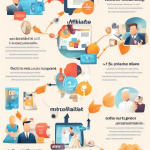The Role of AI Influencers in Shaping Brand Messaging in the Digital Age
The rise of digital marketing has transformed how brands communicate with their audiences, and AI influencers are at the forefront of this evolution. Now, more than ever, companies are leveraging artificial intelligence to create virtual influencers that not only resonate with consumers but also enhance brand messaging. These digital personalities bring unique advantages to the table, redefining traditional marketing strategies.
AI influencers are computer-generated characters that can imitate human behavior with striking realism. They interact with audiences through social media platforms, engage in conversations, and even promote products. The appeal of AI influencers lies in their adaptability and ability to create personalized experiences for users. Brands recognize that this can lead to enhanced engagement and trust, especially in an era where authenticity is paramount.
One of the major benefits of incorporating AI influencers in marketing strategies is their ability to analyze and adapt to audience behavior. Here are some ways in which AI influencers shape brand messaging:
- Data-Driven Insights: AI influencers collect vast amounts of data on audience preferences and engagement patterns. By analyzing this information, brands can tailor their messaging to align precisely with consumer interests.
- Cost-Effective Marketing: Unlike human influencers, AI influencers do not require compensation in the traditional sense. This makes them a cost-effective option for brands aiming for high-impact marketing without exorbitant expenses.
- Consistency and Reliability: AI influencers maintain a consistent brand voice and image. They are free from the unpredictability associated with human personalities like mood swings or personal issues that could impact brand representation.
- 24/7 Engagement: AI influencers are always “on,” offering brands the ability to engage customers at any time. This constant presence can enhance brand visibility and interaction levels.
- Scaling Content Production: With AI influencers, brands can efficiently produce high-quality content across multiple platforms, maximizing their reach and impact.
The use of AI influencers is not without its challenges. One significant concern is the potential lack of emotional connection. While AI can simulate emotions through programmed responses, it lacks the genuine human experience that many consumers seek. The key for brands is to strike a balance between using AI and maintaining authentic human connections.
Moreover, maintaining transparency about AI influencers is crucial. Brands must inform their audiences about the digital nature of these influencers to avoid misleading consumers. Ethical marketing practices call for honesty, and brands that misrepresent their AI influencers risk damaging consumer trust.
Another consideration is the evolving technology behind AI influencers. As artificial intelligence continues to advance, these digital personas become more sophisticated, leading to an increasing expectation among audiences. Brands must stay updated on these developments to leverage the latest capabilities fully.
Looking ahead, the relationship between brands and AI influencers is likely to deepen. Companies will increasingly adopt AI technology to enhance their marketing strategies, driven by the demand for personalization and immersive brand experiences. As AI influencers evolve, they will likely offer new forms of interactive engagement that further redefine brand messaging.
To remain relevant in this competitive landscape, brands should consider these key strategies when integrating AI influencers:
- Know Your Audience: Understand who your audience is and what they are interested in. Use data analytics to shape content that resonates well.
- Maintain a Human Touch: While AI influencers can engage audiences, integrating real human stories and experiences can enhance emotional connection.
- Monitor Performance: Regularly analyze the performance of AI influencer campaigns to see what works and what doesn’t. Be prepared to pivot strategies based on real-time feedback.
- Be Transparent: Always clarify the role and nature of the AI influencer in campaigns. Transparency builds trust, encouraging customer loyalty.
- Stay Innovative: Keep exploring new AI advancements and remain open to adopting new technologies as they become available to maintain a cutting-edge approach.
AI influencers represent a significant advancement in how brands communicate and connect with consumers. By embracing these innovative technologies and strategies, companies can refine their messaging, foster engagement, and drive brand loyalty in an increasingly digital landscape.
Ethical Considerations Surrounding AI Influencers and Their Impact on Authenticity
The rise of AI influencers marks a transformative era in social media and marketing, introducing both innovative possibilities and ethical dilemmas. As brands increasingly turn to artificial personalities to engage audiences, the question of authenticity in these digital personas looms large. How do we perceive the intentions of an AI influencer, and can they ever truly reflect genuine experience or emotion in the same way a human does?
AI influencers, programmed to emulate human behavior, can produce content ranging from fashion tips to holistic wellness advice. They can analyze trending data, post at optimal times, and even interact with followers in real-time. However, the lack of real human experience raises ethical questions about trust and transparency.
One significant concern centers around authenticity. Human influencers often share personal stories, vulnerabilities, and experiences that forge a deeper connection with their audiences. In contrast, AI influencers lack real-life experiences; their background stories and emotions are fabricated narratives designed to appeal to their followers. This bilaterality creates a disconnect—followers may unintentionally engage with a fabricated persona, leading to questions about the honesty of their recommendations.
Understanding the Ethics of AI Influence
Unpacking the ethical implications surrounding AI influencers necessitates addressing several key issues:
- Transparency: It is critical that marketers declare the artificial nature of these influencers. If followers are misled to believe they are communicating with a real person, it undermines trust and integrity in the virtual space.
- Ownership of Content: Content produced by AI influences blurs the lines of intellectual property. Who owns the content generated by an AI influencer? This question can lead to disputes between brand creators and the developers behind the AI.
- Impact on Human Influencers: The rise of AI influences creates direct competition for human content creators. While this expands options for brands, it can also undermine the livelihoods of professional influencers who depend on their authenticity and personal connection to followers.
- Consumer Manipulation: AI influencers can be designed to promote products seamlessly and efficiently, which can lead to consumer manipulation. Promoting products, particularly those in sensitive areas like health and wellness, can result in misguided purchasing decisions.
As brands navigate these waters, it’s essential to weigh both the tangible benefits and the potential pitfalls of using AI in their marketing strategies.
Striking a Balance: Innovation vs. Ethical Responsibility
Though AI influencers provide brands with unprecedented data-driven insights and engagement rates, the ethical considerations demand that they tread carefully. Brands need to formulate guidelines that respect both their audiences and the influencer landscape. Here are some strategies to consider:
- Emphasizing Human Connection: Even when utilizing AI influencers, brands should prioritize authenticity. This can be achieved by combining AI engagements with those of human influencers, creating a multi-dimensional narrative that resonates more effectively with audiences.
- Implement Clear Guidelines: Brands must develop explicit guidelines surrounding the use of AI influencers. Transparency should be a priority, with brands disclosing an influencer’s AI status in all promotional contexts.
- Engage in Ethical Marketing: Prioritize ethical marketing practices by carefully evaluating the content produced by AI influencers. Ensuring accuracy and sensitivity, particularly in industries like health or beauty, is key.
Balancing innovation and ethical responsibility isn’t just crucial; it’s necessary for maintaining consumer trust and loyalty. As the landscape evolves, consumers will continue to expect transparency and integrity from brands, both in AI influencers and human counterparts.
As the world of digital marketing adapts to the influence of artificial intelligence, brands must navigate these challenges tactfully. They need to embrace the capabilities of AI while holding steadfast to ethical practices and authentic engagement. The evolution of AI influencers offers extraordinary opportunities, but walking the tightrope of ethics and authenticity is paramount in preserving the integrity of this new frontier.
Conclusion
The emergence of AI influencers marks a fundamental shift in the landscape of digital marketing and brand communication. These sophisticated digital personalities not only assist brands in conveying their messages but also adapt to evolving consumer preferences with remarkable agility. As brands increasingly embrace AI influencers, they can tailor their marketing strategies to meet the demands of an ever-changing digital landscape. This adaptability makes AI influencers an invaluable asset in shaping brand narratives that resonate with target audiences.
As businesses leverage AI influencers, it’s essential to recognize the unique dimensions they introduce to authenticity and audience engagement. Unlike traditional influencers who bring real-life experiences and personal stories to their followers, AI influencers operate in a realm governed by data. They analyze trends, consumer behavior, and engagement patterns to craft messages that are personalized and relevant. This intelligence allows brands to deliver content that directly appeals to their audience, ultimately leading to improved engagement metrics and stronger brand loyalty.
However, the rise of AI influencers raises important ethical questions regarding authenticity and transparency. With machines taking on a role traditionally occupied by humans, the line between genuine connection and algorithm-driven engagement blurs. Audiences are drawn to influencers for their perceived authenticity, so when a brand employs an AI-driven persona, it’s crucial to ensure that the audience remains aware of the influencer’s artificial nature. This transparency fosters trust and affinity in a world where consumers are more discerning about the content they consume.
The impact of AI influencers on authenticity stretches beyond just brand messaging. It can alter the expectations consumers have when engaging with online personalities. As AI influencers increasingly populate social media platforms, audiences may start to wonder what authenticity truly means in this new context. Authenticity could evolve to include an appreciation for innovation and creativity, allowing AI influencers to carve out their brand of credibility. In this fast-paced digital environment, marketers will need to recalibrate their strategies to address these evolving definitions of trust and engagement.
These evolving dynamics invite brands to rethink their approaches to authenticity. While traditional influencers often connect through personal experiences and human stories, AI influencers can establish credibility through data-backed insights and innovative interactions. Brands that appreciate and cleverly navigate these distinctions may successfully engage audiences hungry for fresh perspectives. A focus on creativity, ethics, and meaningful engagement will pave the way for brands to foster long-term relationships, even in an AI-driven context.
To thrive in this new digital ecosystem, brands must foster a symbiotic relationship with AI influencers that emphasizes ethical responsibility. By ensuring that AI-generated content is both transparent and genuine, companies can maintain trust with their audiences. This balance becomes increasingly vital as consumers demand more from the brands they choose to support. As the debate over AI influencers’ authenticity takes center stage, marketers must prioritize ethical considerations alongside their innovative strategies.
Moreover, the landscape continues to evolve, presenting endless possibilities for AI influencers to reshape brand messaging and consumer interactions. As technology advances, these influencers will likely become even more adept at mimicking human interactions, deepening their impact on audience relationships. For brands to remain competitive, they should not only embrace AI influencers but also thoughtfully weave them into narratives that resonate with their target demographics. By doing so, they can harness both the creativity of AI and the passion of human storytellers to forge deeper connections.
Looking ahead, the interplay between AI influencers and authenticity will shape the future of digital marketing. Brands that understand and adapt to the shifting expectations of their audiences stand to gain significant advantages. They will need to leverage data-driven insights to refine their strategies while maintaining an unwavering commitment to transparency and ethical practices.
As the digital world evolves, the role of AI influencers as essential storytellers will only grow. By striking a balance between technological innovation and authentic engagement, brands can create compelling narratives that resonate with modern consumers, ensuring their messages are not only heard but embraced. Ultimately, the relationship between AI influencers and brands is poised for growth, opening up a new chapter in the art of crafting meaningful brand experiences.


